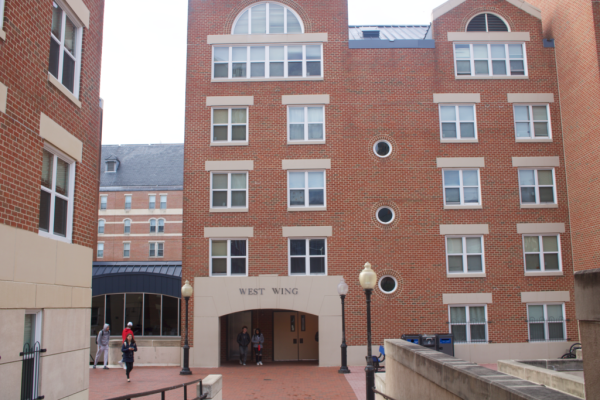A planned power outage from 9 a.m. to 1 p.m. April 9 impacted residents of Georgetown University student dorms Village C East (VCE) and Village C West (VCW), marking the latest in a series of outages that have affected the residence halls.
The outage is the fourth outage affecting VCE and VCW, including both planned and unplanned outages, since April 1. According to emails sent to students by the offices of Planning and Facilities Management and Residential Living, residents lost access to cooling, heating, hot water and elevators, while emergency generators provided lighting to students.
A university spokesperson said the power outages were the result of maintenance on the buildings.
“In recent weeks there have been power outages impacting Village C as a result of necessary electrical upgrades,” the spokesperson wrote to The Hoya. “Emergency generators provided power to lighting and life safety systems.”
“Because of the nature of electrical work, planned outages are sometimes necessary to conduct repairs and maintenance,” the spokesperson added. “The Planning and Facilities Management team works diligently to restore power as quickly as possible.”
Zoe Verma (SFS ’27), a VCW resident, said the planned outages disrupted her routine and other aspects of her daily life as a student.
“For my roommate and I, the biggest concern was our food, and we tried to finish all of our food that was perishable but we had to throw other things away,” Verma told The Hoya. “I would say it was just annoying knowing that it was coming like, ‘Oh, I have to plan around this,’ or, ‘If I sleep past this time, I won’t have AC when I’m sleeping,’ and other things like that.”

Lauren Santoro (CAS ’26), a VCE resident, said she was trying to use the elevator when the power unexpectedly went out April 1.
“I was in the elevator trying to go down from the 10th floor, and then all of a sudden, everything went dark and there was no sound and I was like, ‘This can’t be happening right now,’” Santoro told The Hoya. “I thought that maybe we were having some sort of power outage, but I actually didn’t realize that there was a power outage for sure until I tried to go to Leo’s and they were like, ‘Oh actually we’re closed right now because we don’t have power.’”
Santoro added there was a lack of communication from residential assistants (RAs) surrounding the timing of the outages or the reason behind them.
“I asked my RA last night, like, ‘Hey, do you know why we are having so many outages?’ and she doesn’t know and the other RAs in my building I’ve talked to don’t know either,” Santoro said. “Having one outage is one thing but having multiple — you would think there’d be some sort of other communication that would say what’s actually going on but they haven’t really said anything to us about what the problem is or when it should be expected to be resolved.”
An unplanned power outage affected Village C on April 1. A planned outage occurred April 3 between 9 a.m. and 3 p.m. and an emergency power outage occurred later that day at 11 p.m., ending two hours later. Another planned outage occurred April 9 between 9 a.m. and 1 p.m.
Verma said the outages affected parts of her routine that she didn’t expect.
“Even with the power outages that I was expecting, like today, when I woke up there were no lights or anything,” Verma said. “With the last few power outages, I’ve come back to the dorm in the last 20 minutes of the power outages, and the power had been on both times, so I assumed that this time it would be on again. But then I woke up, and there were no lights, which meant I couldn’t see in the bathroom. It’s such a small thing, but I couldn’t see to do my makeup or tell what I was putting on and things like that.”
Santoro said students on housing accommodations are often put in VCE and VCW, which can pose issues when there are outages and other problems.
“This means that, when you have outages that affect water, electricity, that affect elevators and power, you are essentially risking stranding certain students in the dorm or causing them to have other complications because there isn’t power and there isn’t water,” Santoro said.
Santoro added that the outages can have a big impact on students’ well-being.
“It’s inconvenient for work stuff, but it’s also just harmful for physical health as well and then that’s tied to mental health, and all of it makes a cycle,” Santoro said. “So having a disruption in the environment like a power outage multiple times is just really detrimental.”







